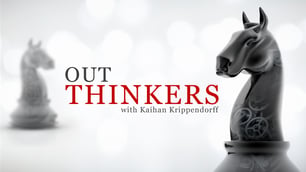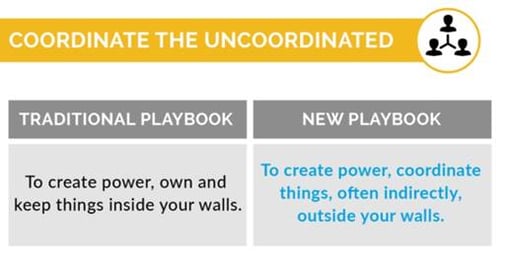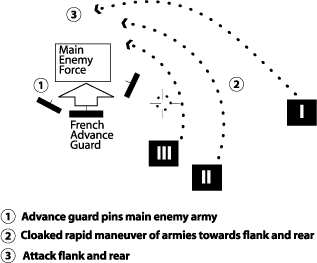 Today’s world economic environment and technological advances demand innovation.
Today’s world economic environment and technological advances demand innovation.
You must OUTthink Your Competition.
As we shared at the conclusion of Godzilla & AFLAC Duck - Create Something Out of Nothing, when you attack the obvious parts of the system, the only way to do better than your competition is to execute better. This is riskier and more tiring. If, instead, you step back and look at the entire system, paying attention to the invisible interconnections, you may find a way to win faster and easier. Today we explore another of the five strategies Outthinkers use, paying attention to invisible connections – Coordinate the Uncoordinated.
I’ve always been a history fanatic, strategy and war fascinate me, and the recommended strategies and tactics in Outthink the Competition: How a New Generation of Strategists Sees Options Others Ignore by Kaihan Krippendorff, are from Sun Tzu, a Chinese general, military strategist, and philosopher and author of The Art of War.
Napoleon Bonaparte, was a military genius. He created new forms of battle to baffle his enemies. One such form is a technique he called maneuvre sur les derrieres, or maneuver at the rear. Bonaparte broke his army into separate columns, each threatening a different target.  His opponent had to disperse its forces to defend multiple locations. Suddenly Bonaparte's swarm of columns would shift direction mid-path, concentrating their force on one common target and overwhelming the enemy now spread to defend itself.
His opponent had to disperse its forces to defend multiple locations. Suddenly Bonaparte's swarm of columns would shift direction mid-path, concentrating their force on one common target and overwhelming the enemy now spread to defend itself.
This is the power of coordination. OUTthinkers today apply this on the corporate battlefield.
If you fail to understand and recognize the patterns (Pattern Recognition) your business too will be overwhelmed.
Krippendorff notes what’s changed since Bonaparte's time is not coordination creating power—the ability to coordinate has always been the source of power. What is changing is how we create power. While competitors remain rooted in an outdated model: We must own things to exert power, today's OUTthinkers see they build power without ownership.
You need to adopt this mind-set to have a chance to compete on tomorrow’s battlefield.
Airbnb, Lyft, Uber. These are examples of company’s coordinating the uncoordinated, building power without traditional ownership.
Political Revolutions and Coordination
In Outthink the Competition: How a New Generation of Strategists Sees Options Others Ignore by Kaihan Krippendorff shares the year 2011 in the Middle East. We saw entrenched autocrats suddenly fall in Tunisia, Egypt, and across the region. Why did this happen in 2011 and not five years earlier? Because advances in technology and the broad acceptance of social media had created a level of connectivity unimagined just a few years ago. That connectivity is fundamentally changing society by enhancing our ability to coordinate. This mammoth change has four ingredients: speed, syndication, integrity, and transparency.
Speed
Paul Revere made his, “The British are coming!” 13.5 mile ride in 2 hours. In a car today it would take 45 minutes (traffic!), a telephone he could achieve similar results in 15 minutes. One tweet, a Facebook update, and today you can do the job in 3 seconds! The time for a revolutionary community to react has dwindled from two hours to just 3 seconds!
Syndication
If Revere's message ended up reaching the wrong person, such as someone who didn't care or, worse yet, someone who disagreed with him (a British loyalist, for example), the movement might never have built momentum. Today’s technology allows you to transmit more quickly, it allows you to syndicate it more precisely and specifically. You can reach people who agree with and take action with you. Chances of your revolution falling into the wrong hands and petering out dramatically diminish.
Integrity
Perhaps as a child you remember playing the telephone chain game? By the time the message travels around the circle, it sounds nothing like the one you started. Message integrity is reduced with each transmission. Today, your friends can share your message exactly as you wrote it. An American Eagle Outfitters store close to Krippendorff’s New York office discovered hundreds of pedestrians suddenly taking off their shirts and walking by at precisely the same time. How? Tweeting a message, “Walk in front of American Eagle Outfitters on Wednesday at 3:32 PM and take off your shirt”— spread without distortion.
Transparency
The greatest barrier to revolutionary movements Machiavelli wrote, “And it will always happen that he who is not your friend will request your neutrality and he who is your friend will ask you to declare yourself by taking up arms. And irresolute princes, in order to avoid present dangers, follow the neutral road most of the time, and most of the time they are ruined.”
Dictators (and powerful incumbent corporations) depend on this dynamic to hold on to power. By quelling unrest early, they preempt even the appearance that unrest exists. People think, “This government, this leader, is not working for me,” but they look around and think they are in the small minority, so they put up with it. Consumers think, “I really don't like this product,” but everyone they speak to seems to be using it, so they go along.
Shrinking Coordination Barriers
These shrinking four barriers is fundamentally changing our ability to organize ourselves. We can send messages more quickly (speed), multiply our odds of reaching the right people (syndication), transmit our message without distortion (integrity), and show the world they are not alone (transparency). The disappearance of these barriers transformed the Middle East political map. It is transforming the power dynamic of industries.
In Annual Planning for 2018, these OUTthinker Strategies are a top priority with my Positioning Systems customers. Is your company exploring disruptive opportunities to achieve greater success?
Every business needs to discover new ways to generate revenue and OUTthink Your Competition. If you’re looking for innovative ways to develop your business, contact dwick@positioningsystems.com. Or take our Four Decisions Needs Assessment and we’ll contact you.
 Coordinate the Uncoordinated Examples – Next Blog
Coordinate the Uncoordinated Examples – Next Blog
The nature of Power has not changed. How we coordinate Power is. Remember the Sony’s Walkman? How did Sony’s founder come up with this idea? We’ll share examples of Coordinate the Uncoordinated, like FedBid, next blog.






.jpeg?width=150&height=135&name=Hand%20with%20marker%20writing%20the%20question%20Whats%20Next_%20(1).jpeg)

